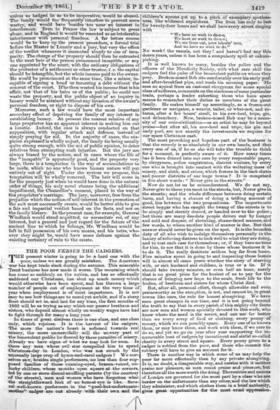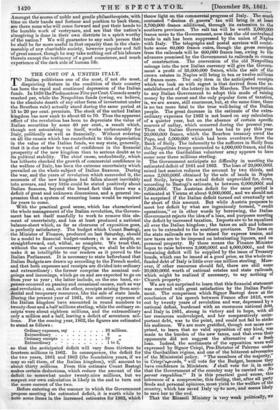THE POOR VERSUS THE CADGERS.
MITE present winter is going to be a hard one with the _IL poor, unless we are greatly mistaken. The American war has kept trade slack during the autumn. This miserable Trent business has now made it worse. The mourning which has come so suddenly on the nation, and has so effectually saddened our Christmas, has shut up much money which would otherwise have been spent, and has thrown a large number of people out of employment at the very time of year when employment is of most importance. It is not easy to see how things are to mend yet awhile, and if a sharp frost should set in, and last for any time, the first mouths of 1862 will be as trying as any which our poorer brethren and sisters, who depend almost wholly on weekly wages have had to fight through for many a long year. In times of great distress there is one class, and one class only, which rejoices. It is the harvest of the cadgers. The more the nation's heart is softened towards real misery, the more unmercifully will the unwary part of the benevolent public be fleeced by these parasites of misery. Already we have signs of what we may look for soon. Ia there any man whose evil star compelled him to spend Christmas-day in London, who was not struck by the unusually large crop of hymn-and-carol cadgers ? We our- selves saw, besides single performers, no less than four sup- posed families of those cunning-eyed, brazen-voiced, un- lucky children, whose mouths open square at the corners, led by one or more dismal snuffling parents (by the courtesy of the streets), men and women who have forgotten what the straightforward look of an honest eye is like. Seve- ral well-known performers in the "good-but-unfortunate- mother" cadger are out already with their own and the children's aprons got up to a pitch Of exemplary spotless- ness, like whitened sepulchres. The frost has only to last for twenty-four hours and we shall have every street ringing with "We have no work to do-o-o, We have no work to do-o-o; We are froze out, pore laborin' men, And we have no work to do."
No work ! the rascals, not they ! and haven't had any this dozen years, unless it has been a compulsory spell at oakum- picking.
It is well known to many, besides the police and the officers of the Mendicity Society, with what rare skill the cadgers feel the pulse of the benevolent public on whom they prey. Broken-nosed Bob sits comfortably over his early purl and after-breakfast pipe, and reads his morning paper. He sees an appeal from an east-end clergyman for some special class of sufferers, comments on the slackness of some particular trade, perhaps a leader exhorting those who have spare means to remember their duties as members of the great family. He makes himself up accordingly, as a frozen-out gardener or navigator, a weaver, tailor, or what-not, and re- turns, after a few hours' stroll, to his cow-heel, tripe, gin, and debauchery. Now, broken-nosed Bob may be a neces- sity of our over-civilization—as an artist he may be beyond praise—but after all, his cow-heel and tripe, his gin and early purl, are not exactly the investments we require for our spare Christmas cash.
The most provoking and hopeless part of the business is that the remedy is so absolutely in our own hands, and that every one of UB, if he or she will take the trouble to think for a moment, is perfectly aware of it. How many times has it been dinned into our ears by every respectable paper, by clergymen, police magistrates, district visitors, by every one who is brought into contact with the weltering mass of misery, and sloth, and crime, which festers in the back slums and poorer districts of our huge towns ? It is comprised in five short words: " Never give in the streets."
Now do not let us be misunderstood. We do not say, Never give to those you meet in the streets, but, Never give in the streets; and the whole difference between doing certain harm, and having a chance of doing a trifling amount of good, lies between the two propositions. The importunate street beggar who has caught the twang of the streets is to be simply and sternly denied, or handed over to the police ; but there are many desolate people driven out by hunger and cold and despair, of shrinking, shame-faced manner, and few words, to whom another kind of answer is due. But that answer should never be given on the spot. It is the bounden duty of all who wish to indulge themselves personally in the luxury of relieving distress to look well to what they are doing, and to test each case forthemselves ; or, if they have no time for this, to see that it is done by those whose business it is to do it. The really destitute seldom beg far from home. Five minutes spent in going to and inspecting those homes will in almost all cases prove whether the story of starving wife, or sick husband and children, is true or a lie. If it should take twenty minutes, or even half an hour, surely that is no great price for the busiest of us to pay for the chance of bringing new hope to the souls, fresh life to the bodies, of brethren and sisters for whom Christ died. But, after all, personal effort, though allowable and even praiseworthy as the exception, is not, and cannot be, in great towns like ours, the rule for honest almsgiviug. We have seen great changes in our time, and it is not going beyond the truth to say that in every parish of this mighty city there are now men and women specially devoted to this work, who know where the need is the sorest, and can use far better than we every scrap of food or clothing, every penny of money, which we on possibly spare. Every one of us knows them, or may know them, and work with them, if we care to do so, and yet we go on year after year supporting the in- numerable host of cadgers by incontinent and sinful so-called charity in every street and square. Every penny given to a cadger is robbed from the poor, and those who coinmit the robbery will have to give an account for it. There is another way in which some of us may help the poor far more effectually than by any private almsgiving. It is, no doubt, a disagreeable way, and carries with it neither praise nor pleasure, as men count praise and pleasure, but therefore all the more worth the doing. Thevestries and unions of Londpn are governed for the most part by a class vi ho are harder on the unfortunate than any other, and the law which they administer, and which clothes them in a brief authority, gives great opportunities for the most cruel oppression, Amongst the scores of noble and gentle philanthropists, with time on their hands and fortune and position to back them, are there none who will come forward and put their hands to the humble work of vestrymen, and see that the nation's almsgiving is done in their own districts in a spirit worthy of the nation ? We will guarantee to any such person that he shall be far more useful in that capacity than in the chair- manship of any charitable society, however popular and full of great names, though he may take nothing out of his labours therein except the testimony of a good conscience, and much experience of the dark side of human life.





























 Previous page
Previous page